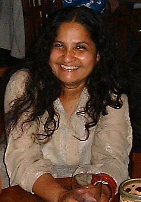
The Bangladesh Nationalist Party is a major political party in Bangladesh. Founded on 1 September 1978 by Bangladeshi president Ziaur Rahman with a view of uniting people with a nationalist ideology, BNP later became one of the two dominant parties in Bangladesh, along with its archrival Awami League. Initially a big tent centrist party, it later moved towards more right-wing politics.

The Bangla Academy is the official regulatory body of the Bengali language in Bangladesh. It is an autonomous institution funded by the Government of Bangladesh that fosters the Bengali language, literature and culture, works to develop and implement national language policy and conducts original research in Bengali. Established in 1955, it is located in the Burdwan House in Shahbagh, Dhaka, within the grounds of the University of Dhaka and Suhrawardy Udyan. The Bangla Academy hosts the annual Ekushey Book Fair.

Nasreen Pervin Huq was a prominent women's activist and campaigner for women's rights and social justice. She died in an accident at her home in Dhaka, when she was crushed by a vehicle. The vehicle was driven by her chauffeur, who was picking her up to go to work as Director of the UK non-governmental organisation Action Aid. Though her death was ruled accidental, some think the driver was paid off by a foreign figure.
Mohammad Yakub Ali Chowdhury was a Bengali essayist and journalist. He was noted as one of the few Bengali Muslim literary scholars of his time.

Baridhara is an upscale residential area in Dhaka, Bangladesh. It is located on the east of and north east of Gulshan across Gulshan-Baridhara Lake. It has special zones designated for diplomats, and many of the city's foreign embassies and high commissions are situated here. There are mainly three areas diplomatic zone mainly in the south-west portion, general residential area in eastern portion and an adjacent DOHS area in north-east portion.

Fazlul Quader Chowdhury was a Bengali politician who served as the 5th speaker of the National Assembly of Pakistan from East Pakistan. He belonged to Ayub Khan's Convention Muslim League. He was also the acting president of Pakistan from time to time when Ayub Khan left the country. His elder brother Fazlul Kabir Chowdhury was the leader of the opposition in East Pakistan assembly. Quader was preceded by Maulvi Tamizuddin Khan of Awami League.

Yusuf Ali Chowdhury, commonly known as Mohan Mia, was a leading Muslim League politician from Bengal. He campaigned for Bengali Muslim civil rights in British India. Hailing from a prominent landowning clan of Faridpur, he was elected to the Bengal Legislative Assembly in 1937. He was a leader of the Pakistan movement and the Bengal Provincial Muslim League.
Chowdhury Kamal Ibne Yousuf was a Bangladeshi politician who served as government minister.

Shaheed Suhrawardy Medical College (ShSMC) is a public medical college and hospital located in Dhaka, the capital city of Bangladesh. It was named after Huseyn Shaheed Suhrawardy.

Mirza Fakhrul Islam Alamgir is a Bangladeshi politician. He has been the secretary general of the Bangladesh Nationalist Party (BNP) since 2016. He was a member of the parliament for Thakurgaon-1 constituency from 2001 to 2006. In that term, he was also appointed the Minister of State in charge of the Ministry of Agriculture and later Ministry of Civil Aviation and Tourism.
Serajul Huq was a Bangladeshi educationist.

Feminism in Bangladesh seeks equal rights of women in Bangladesh through social and political change. Article 28 of Bangladesh constitution states that "Women shall have equal rights with men in all spheres of the State and of public life".
Ibrahim Khan was a Bangladeshi litterateur. He was awarded Ekushey Padak in 1977 by the Government of Bangladesh.
The Officers Club, Dhaka is a government high officals recreation club in Dhaka, Bangladesh. Mesbah Uddin, the then additional secretary of the Local Government Division, was elected as general secretary of the club in 2019 with the term ending in 2021. The club has been described as being "exclusive".

Rafique Ul Huq was a Bangladeshi lawyer who served as the Attorney General of Bangladesh in 1990.
Moyeenul Islam Chowdhury is a retired judge of the Bangladesh High Court.

New Dhaka, is an unofficial term used to describe the area located north of Old Dhaka that has been incorporated in the city of Dhaka, the capital and largest city of Bangladesh over time. The term is ambiguous, as it may refer either to upscale and/or planned neighbourhoods with wider streets, modern buildings, and improved facilities, or to the city of Dhaka excluding the Old Dhaka region.











